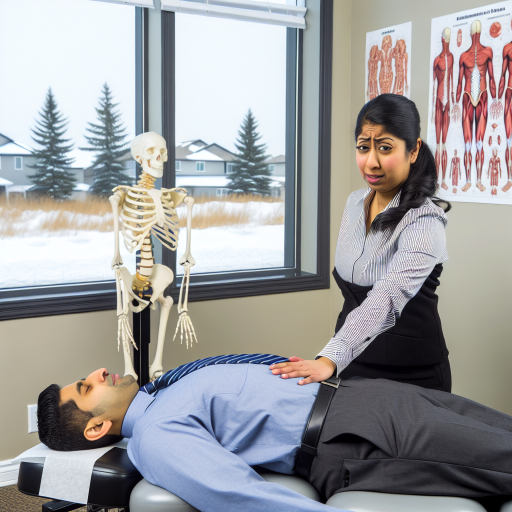Overview of Kinesiology
Definition of Kinesiology
Kinesiology is the scientific study of human movement.
It blends principles from biomechanics, anatomy, and physiology.
Kinesiologists apply this knowledge to enhance physical performance.
Furthermore, they aid in rehabilitation and injury prevention.
Scope of Kinesiology
The scope of kinesiology is broad and interdisciplinary.
Kinesiologists work in various settings, including healthcare and fitness.
They contribute to sports organizations, educational institutions, and rehabilitation centers.
Moreover, they collaborate with healthcare professionals to promote wellness.
Role of Kinesiologists
Kinesiologists design exercise programs tailored to individual needs.
They conduct assessments to identify movement patterns and dysfunctions.
Additionally, they educate clients on safe exercise techniques.
Their work also involves research to advance the field of kinesiology.
Emerging Trends in Kinesiology
The demand for kinesiologists is increasing in healthcare settings.
More professionals are recognizing the importance of movement in health.
Technology integration in rehabilitation also promotes kinesiology practice.
As a result, kinesiologists are becoming key players in healthcare teams.
Current Trends in Health Care and Wellness Industry
Increasing Focus on Preventative Care
The health care industry is shifting towards preventative care strategies.
This trend emphasizes reducing the occurrence of diseases.
Consequently, kinesiologists play a crucial role in this approach.
They design programs that promote movement and wellness.
This focus helps individuals maintain healthier lifestyles.
Integration of Technology in Health Management
Technology is reshaping how health care is delivered.
Telehealth services are becoming increasingly popular.
Kinesiologists utilize wearable devices to monitor patient progress.
This integration leads to personalized treatment plans.
Unlock Your Career Potential
Visualize a clear path to success with our tailored Career Consulting service. Personalized insights in just 1-3 days.
Get StartedData-driven decisions enhance patient outcomes significantly.
Holistic Approaches Gaining Popularity
Patients are seeking holistic health care solutions.
This trend encompasses physical, emotional, and social well-being.
Kinesiologists are well-equipped to support these efforts.
They incorporate various therapies into their practice.
Integration of mental health awareness aids overall health improvement.
Rise in Health Awareness Among Populations
There is a growing public awareness regarding health issues.
This awareness drives individuals to seek professional help.
Kinesiologists are increasingly recognized for their expertise.
Education on injury prevention and rehabilitation is essential.
Individuals are motivated to prioritize their physical health.
Collaboration Among Health Professionals
Multidisciplinary approaches are becoming common in health care.
Kinesiologists work alongside physicians and physiotherapists.
This collaboration enhances treatment efficacy and patient care.
Interdisciplinary teams lead to comprehensive health strategies.
Such teamwork is vital for addressing complex health issues.
Factors Driving the Demand for Kinesiologists
Increased Health Awareness
People are becoming more aware of their health and wellness.
This trend highlights the need for professional guidance.
Kinesiologists play a crucial role in preventive health care.
Aging Population
The global population is aging rapidly.
Older adults require more specialized care and rehabilitation.
Kinesiologists help improve mobility and enhance quality of life.
Rise in Chronic Conditions
Chronic diseases are becoming increasingly prevalent.
This situation demands innovative solutions for rehabilitation.
Kinesiologists develop personalized exercise programs for patients.
Focus on Preventive Care
Health care systems are shifting toward preventive care models.
Professionals in this field educate clients about healthy lifestyles.
Kinesiologists are key in promoting injury prevention strategies.
Integration of Technology
Health technology is transforming rehabilitation practices.
Kinesiologists use digital tools for assessments and progress tracking.
This integration enhances the effectiveness of treatment plans.
Collaboration with Other Health Professionals
Kinesiologists increasingly work alongside various health professionals.
This collaboration ensures comprehensive patient care.
For instance, physiotherapists and kinesiologists often share strategies.
Growing Sports and Fitness Industry
The sports and fitness sector is expanding rapidly.
Recreational athletes seek professional assistance for performance enhancement.
Kinesiologists provide specialized knowledge in exercise science.
Find Out More: Career Pathways For Speech-Language Pathologists
Roles and Responsibilities of Kinesiologists in Health Care
Overview of Kinesiologists’ Functions
Kinesiologists play a crucial role in health care settings.
They specialize in movement analysis and physical rehabilitation.
Furthermore, they design personalized exercise programs for patients.
Additionally, they assess physical capabilities and limitations.
Collaboration with Other Health Professionals
Kinesiologists often work alongside physiotherapists and doctors.
This collaboration enhances patient care and treatment outcomes.
Moreover, they frequently consult with occupational therapists for rehabilitation planning.
Patient Education and Support
Education is a vital aspect of a kinesiologist’s role.
They inform patients about the importance of physical activity.
Furthermore, they provide guidance on injury prevention strategies.
They empower patients to take charge of their health through knowledge.
Rehabilitation and Recovery Programs
Kinesiologists design rehabilitation programs tailored to individual needs.
These programs aim to restore mobility and function following injuries.
They utilize techniques that promote healing and prevent further injuries.
Ultimately, their goal is to enhance patients’ quality of life.
Research and Development in Kinesiology
Many kinesiologists engage in research to improve practices.
This research helps advance understanding of human movement.
Additionally, it contributes to innovative treatment methods and technologies.
Kinesiologists also participate in clinical trials to assess new interventions.
Learn More: Why Chiropractic Care Is Essential For Athletes
Kinesiologists vs. Other Health Care Professionals: A Comparative Analysis
Role of Kinesiologists
Kinesiologists specialize in human movement and biomechanics.
They assess physical performance and design rehabilitation programs.
Moreover, they focus on optimizing physical activity for health benefits.
These professionals work in various settings, including clinics and sports centers.
Comparison with Physiotherapists
Both kinesiologists and physiotherapists promote mobility and function.
However, physiotherapists often handle acute injuries and rehabilitation post-surgery.
Kinesiologists, on the other hand, typically focus on preventative measures.
They emphasize exercise as a tool for enhancing overall wellness.
Collaboration with Occupational Therapists
Kinesiologists and occupational therapists share similar goals of improving daily living skills.
Occupational therapists concentrate on adapting environments for individuals.
Meanwhile, kinesiologists examine movement patterns to prevent injuries.
This collaboration ensures comprehensive care for clients.
Distinct Roles of Registered Nurses
Registered nurses primarily provide patient care and support medical needs.
In contrast, kinesiologists target physical performance and exercise science.
Nurses play a crucial role in monitoring vital signs and administering medications.
Kinesiologists enhance functional abilities via tailored movement strategies.
Importance of Teamwork in Health Care
Effective collaboration among health care professionals benefits patients.
Each discipline brings unique expertise to the table.
Together, they create well-rounded and personalized treatment plans.
This teamwork ultimately improves patient outcomes and satisfaction.
See Related Content: How Kinesiologists Use Exercise to Treat Medical Conditions
Educational Requirements and Professional Certifications for Kinesiologists
Degree Requirements
Kinesiologists typically hold a bachelor’s degree in kinesiology or a related field.
Some positions may require a master’s degree for advanced practice.
Undergraduate programs include coursework in anatomy, physiology, and biomechanics.
Many universities also offer practical experiences through internships.
Professional Certifications
To practice, kinesiologists often obtain professional certifications.
The Certified Kinesiologist designation is among the most recognized credentials.
This certification requires passing an examination and adhering to ethical standards.
In some regions, licensure may also be required based on local regulations.
Continuing Education
Kinesiologists must engage in continuing education to maintain their certifications.
This can involve attending workshops, seminars, or additional courses.
Staying current with research and trends is essential for effective practice.
Continuing education ensures practitioners remain competent in their field.
Additional Skills
Kinesiologists should develop strong communication skills.
Effective communication enhances interactions with clients and colleagues.
Moreover, problem-solving skills are crucial in developing individualized treatment plans.
Lastly, knowledge of technology is becoming increasingly important in this field.
Explore Further: Top Reasons To Visit A Chiropractor Regularly

Employment Opportunities and Career Paths for Kinesiologists
Understanding the Role of Kinesiologists
Kinesiologists specialize in human movement and exercise science.
They work with individuals to enhance physical performance.
Additionally, they help in injury prevention and rehabilitation.
Career Opportunities
The demand for kinesiologists is rising across various sectors.
Health care facilities actively seek kinesiologists for rehabilitation programs.
They may also find opportunities in sports organizations.
Moreover, education systems employ kinesiologists for physical education.
Fitness centers and wellness programs also hire them for training roles.
Specialization Areas
Kinesiologists can choose from several specialization areas.
Some focus on rehabilitation and post-injury recovery.
Others may specialize in ergonomics and workplace safety.
Performance enhancement in athletes is another key area.
There is also a growing field in chronic disease management.
Work Settings
Kinesiologists work in diverse environments.
Hospitals and clinics are common workplaces.
Private practices provide additional opportunities for employment.
Research institutions often seek kinesiologists for studies.
Corporate wellness programs increasingly engage kinesiologists.
Educational Requirements
A degree in kinesiology is the foundational requirement.
Many positions require a master’s degree or specialization certifications.
Continuing education is vital to stay updated in the field.
Job Outlook and Salary Expectations
The job market for kinesiologists looks promising.
With the rise in preventive health care, demand is expected to grow.
Additionally, salary ranges vary according to specialty and experience.
Most kinesiologists find ample opportunities for advancement.
Case Studies of Kinesiologists Impacting Patient Care
Improving Rehabilitation Outcomes
Kinesiologists play a key role in rehabilitation settings.
For instance, Sarah Thompson works at a local rehabilitation center.
Her expertise in movement science enhances patients’ recovery processes.
She develops individualized exercise programs tailored to specific injuries.
As a result, patients experience faster recovery and improved functionality.
Enhancing Chronic Pain Management
Chronic pain management is another area where kinesiologists excel.
Michael Harris specializes in working with chronic pain sufferers.
He uses evidence-based techniques to teach pain management strategies.
His approach encourages patients to engage in regular physical activity.
Consequently, patients report reduced pain levels and increased quality of life.
Promoting Preventative Health
Kinesiologists also focus on preventative health measures.
Emily Carter developed a community program aimed at reducing obesity rates.
This program incorporates physical activity and nutritional education.
By using interactive workshops, she promotes sustainable lifestyle changes.
Participants achieve improved physical health and well-being.
Supporting Mental Health Initiatives
The contribution of kinesiologists extends into mental health support.
James Mitchell collaborates with mental health professionals in therapy sessions.
He uses physical activity as a therapeutic tool for anxiety and depression.
His sessions help clients develop coping strategies through movement.
This integration leads to enhanced emotional well-being and resilience.
Future Outlook: The Evolving Role of Kinesiologists in Health Care
Increasing Demand for Kinesiologists
Kinesiologists are increasingly sought after in diverse health care settings.
Their expertise in movement science enhances patient recovery and well-being.
Moreover, health care providers recognize their contributions to rehabilitation.
Integration in Multi-Disciplinary Teams
Kinesiologists now join forces with other health professionals.
They collaborate closely with physiotherapists, occupational therapists, and doctors.
This integration leads to improved patient care and outcomes.
For instance, they provide valuable insights on physical activity and biomechanics.
Expanding Roles in Preventive Health
Kinesiologists play a critical role in preventive health initiatives.
Their focus on movement and exercise promotes healthier lifestyles.
They educate patients about maintaining physical fitness.
This proactive approach helps reduce the risk of chronic diseases.
Technology and Innovation
Advancements in technology further enhance the role of kinesiologists.
They utilize tools like wearable devices to track progress.
Additionally, virtual consultations become integral to patient management.
This embrace of technology allows for personalized treatment plans.
Future Challenges and Opportunities
The growing demand presents both challenges and opportunities for kinesiologists.
They must continuously update their skills to meet evolving needs.
Ongoing education remains essential to keep pace with health care advancements.
Ultimately, kinesiologists are well-positioned to shape the future of health care.
Additional Resources
Shideh Esfandnia – North Vancouver, British Columbia, Canada …




